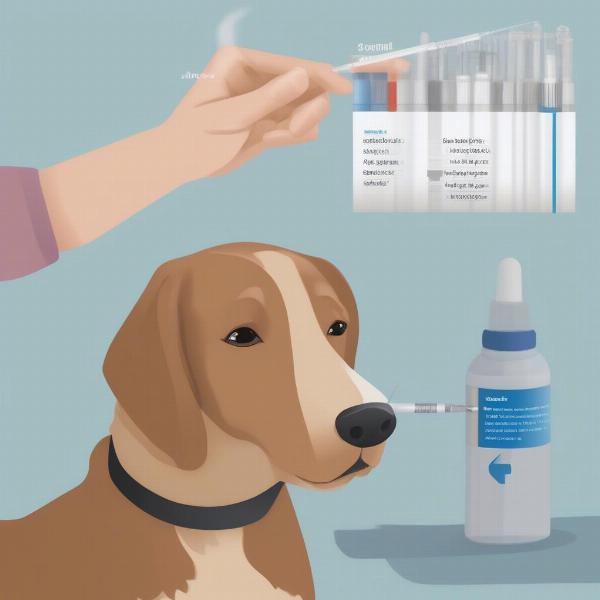Clavamox 250 mg is a commonly prescribed antibiotic for dogs. This guide provides in-depth information about Clavamox 250 mg for dogs, covering its uses, dosage, potential side effects, and important considerations for pet owners. Understanding this medication can help you ensure your furry friend receives the best possible care.
What is Clavamox and how does it work? Clavamox is a broad-spectrum antibiotic containing amoxicillin and clavulanate potassium. It effectively combats various bacterial infections in dogs. Amoxicillin disrupts bacterial cell wall formation, while clavulanate potassium enhances amoxicillin’s effectiveness by inhibiting enzymes that some bacteria produce to resist amoxicillin.
Understanding Clavamox 250 mg Dosage and Administration
Administering the correct dosage of Clavamox is crucial for its effectiveness and your dog’s safety. The typical dosage is 6.25 mg per pound of body weight, administered twice daily. However, always follow your veterinarian’s prescribed dosage, as it may vary based on the specific infection and your dog’s individual health. Clavamox is available in tablet and liquid form. Tablets can be given directly or crushed and mixed with food. If using the liquid form, ensure accurate measurement using the provided syringe. Never administer more than the prescribed dose.
 Clavamox Dosage and Administration for Dogs
Clavamox Dosage and Administration for Dogs
Common Uses of Clavamox 250 mg in Dogs
Clavamox 250 mg is effective against a range of bacterial infections in dogs, including skin infections (such as pyoderma, abscesses, and cellulitis), soft tissue infections, urinary tract infections, respiratory infections, and dental infections. It’s important to remember that Clavamox is only effective against bacterial infections and not viral or fungal ones. Your veterinarian will diagnose the cause of your dog’s illness and determine if Clavamox is the appropriate treatment.
Potential Side Effects of Clavamox in Dogs
While generally safe, Clavamox can sometimes cause side effects in dogs. Common side effects include vomiting, diarrhea, loss of appetite, and lethargy. More severe, but less common, side effects include allergic reactions (such as hives, facial swelling, and difficulty breathing), seizures, and liver problems. If your dog experiences any side effects, contact your veterinarian immediately.
What to Discuss with Your Veterinarian Before Administering Clavamox
Before giving your dog Clavamox, inform your veterinarian about any other medications your dog is taking, any known allergies, any history of kidney or liver disease, and if your dog is pregnant or nursing. This information will help your veterinarian determine the safest and most effective treatment plan for your dog.
Conclusion
Clavamox 250 mg can be a valuable tool in treating bacterial infections in dogs. By understanding its uses, dosage, and potential side effects, you can help ensure your dog receives the best possible care. Always consult with your veterinarian for a proper diagnosis and treatment plan, and never hesitate to contact them if you have any concerns about your dog’s health.
FAQ
- How long does it take for Clavamox to work in dogs? Clavamox typically starts working within a few days, but it’s important to complete the entire prescribed course, even if your dog appears to be feeling better.
- Can I give my dog Clavamox for a cold? Colds are typically caused by viruses, and Clavamox is only effective against bacteria. Your veterinarian can diagnose the cause of your dog’s illness and determine the appropriate treatment.
- What should I do if I miss a dose of Clavamox? Give the missed dose as soon as you remember, unless it’s close to the time for the next dose. In that case, skip the missed dose and resume the regular schedule.
- Can Clavamox be given with food? Yes, Clavamox can be given with or without food.
- How should I store Clavamox? Store Clavamox at room temperature, away from moisture and direct sunlight.
- What happens if my dog overdoses on Clavamox? Contact your veterinarian or an emergency animal hospital immediately.
- Is Clavamox safe for all dogs? While generally safe, some dogs may have allergies or underlying conditions that make Clavamox unsuitable. Always consult your veterinarian before administering any medication.
About ILM Dog
ILM Dog is your trusted global resource for all things dog-related. We offer expert advice on dog breeds, health, training, nutrition, grooming, and much more. From puppy care to senior dog care, we’re here to support you every step of the way. Whether you’re a first-time dog owner or a seasoned pro, ILM Dog provides reliable information to help you provide the best care for your furry companion. Contact us today for personalized guidance: Email: [email protected], Phone: +44 20-3965-8624.